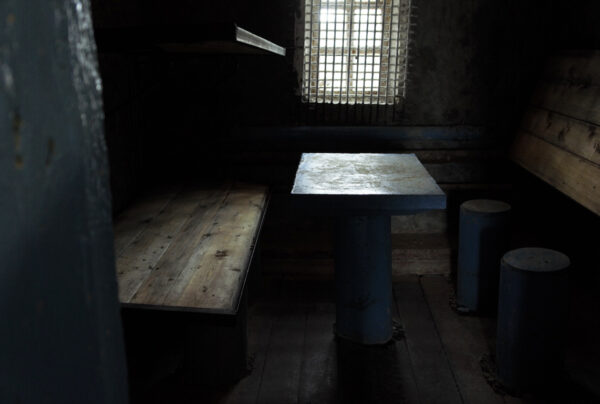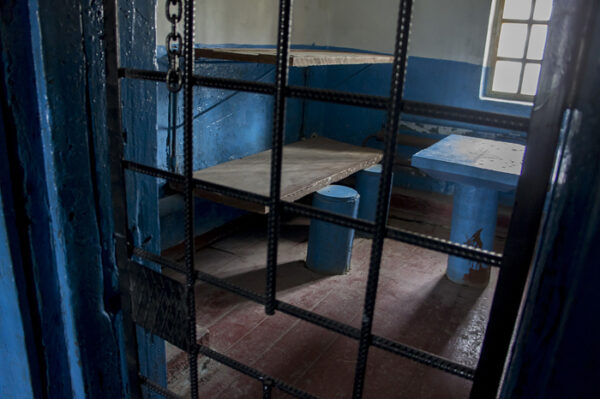The SHIZO was one of the severest punishments for camp prisoners. In the maximum-security section, the only punishment more severe was being put in the chamber-type cell (PKT), and in solitary confinement in the special security section.
“For violating prison regulations, the following measures may be applied: a warning or reprimand; extra duty for tidying quarters and camp territory: deprivation of a meeting; deprivation of the right to receive a parcel or package and prohibition from buying groceries for a period of up to one month; cancellation of improved prison conditions; transfer to the punishment cell with or without being sent to work”
Article 53 of the Corrective labor code of the RSFSR, 1970
In the punishment cell, prisoners did not have matrasses or sheets, and they slept on bare boards of a fold-out bunk, which was fixed to the wall at 6 a.m. and taken down at 10 p.m. They were not taken out for walks, they were forbidden to smoke, they did not have books or newspapers, and they were not given letters they received.
The walls of the cell were covered in rough cement, a so-called “fur coat”. It was impossible to lean against them. Initially, the period of detainment in the cell was limited to 15 days, but a secret order of the USSR Interior Ministry No. 20 of 14 January 1972 permitted for this term to be extended with new orders for holding prisoners. The total period for holding prisoners in the cell was only limited by the state of their health. The PKT cells with the same fold-up bunks were different in that they had smooth walls, and at night prisoners were given matrasses and sheets.
“.., in the cell, in solitude: no books, no newspaper, no paper, no pencil. You’re not taken out for walks, or to the bathhouse, you’re fed every two days, there’s practically no window, there’s a lamp somewhere in a niche, in the wall, right by the ceiling, it barely illuminates the ceiling. There’s one hollow in the wall – your table, another is a chair, you can’t sit on it for more than ten minutes. Instead of a bed for the night you’re given a bare wooden board. You’re not given any warm clothing. In the corner there’s a slop bucket, or just a hole in the floor, which stinks all day. In short, it’s a cement bag. And smoking is prohibited. The dirt is eternal. There’s blood spattered across the walls, because tuberculosis patients are also held here. And so you start to sink beneath the water, to the very bottom, into the ooze. That’s what it’s called in prison: to sink into the cell, to rise from the cell.”
Vladimir Bukovsky “And the wind returns…”
“Persons moved to the punishment cell… to the chamber-type cell… and also to the solitary confinement cell receive food according to reduced norms,” – article 56 of the corrective labor code of the RSFSR for 1970. Meat and animal fats were completely excluded from their ration. If the prisoner in the cell did not work – if he refused to work himself or was put in the cell with the instructions “without being taken to work”, he received food based on the punishment norm established in 1939: one hot meal every second day, and every other day 450 grams of bread and 20 grams of salt. After a few days of this food, the smell of acetone appeared on the prisoner’s breath – the muscle tissues began to break up. International law has declared this norm to be torture by starvation.
The SHIZO at the Perm-36 camp was especially harsh. The punishment cells and the chamber-type cells were in the same brick building built in the late 1940s, and were sometimes mutually interchangeable if necessary. The building was constructed in such a way that it was even cool during the July heat, and very cold in winter, while prisoners only wore a light cotton robe and slept on bare bunk boards painted with enamel.
The founders of the museum often heard people say: “Here even the old Lithuanians cried,” – the unbending Lithuanian partisans who grew old in the camp, serving their incredible 25-year sentences and preserving their dignity to such an extent that they refused to talk with the camp officers in Russian – but even they were unable to hold back the tears from the cold, pain and sense of helplessness.





